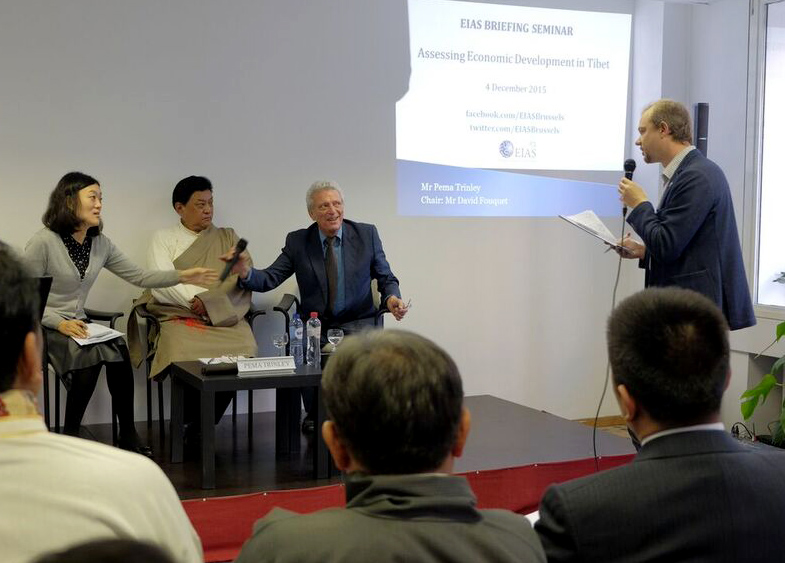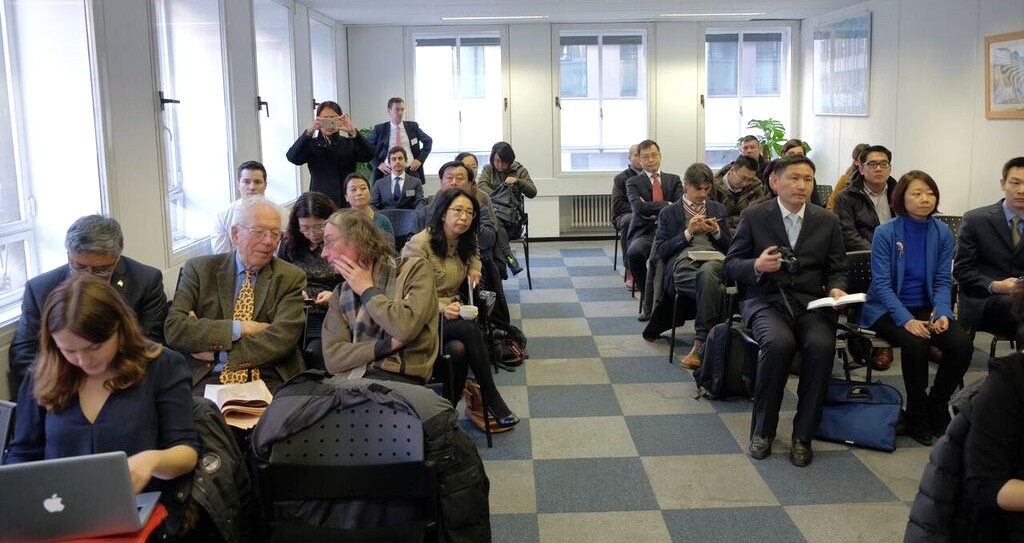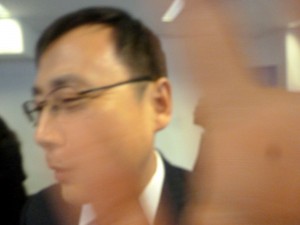
Vincent Metten (ICT) asking questions during the Q&A Sassion. On the panel from left to right: the chinese interpreter, Mr Pema Thinley and EIAS moderator Mr Fouquet.
Pema Thrinley (Chinese transliteration: Baima Chilin) the Vice Chairman of the Ethnic Affairs Committee, National People’s Congress of China spoke about “Assessing Economic Development in Tibet”. We believe that this is in direct contravention of the mandate of the European Institute for Asian Studies, as a “leading Brussels-based Think Tank and Policy Research, which provides a platform for the promotion of dialogue and understanding between the European Union and Asia on affairs of strategic regional and global importance, hereby ensuring indepth, comprehensive research and information exchange.” (www.eias.org)
Pema Trinley served in the People’s Liberation Army based in Tibet from 1969 to 1986, a military career which could be as an important credential for the continued implementation of harsh security policies in the region that have become the norm for the Party in handling Tibet. He is seen as a man who had played a prominent role in justifying the crackdown on Tibetans after the March 2008 protests in the Tibetan capital city, Lhasa. This year Pema Trinley accused the Dalai Lama of “profaning religion and Tibetan Buddhism” as a reaction to Dalai Lama’s remarks that he might not be reincarnated when he dies.
The decision by EIAS to invite this official delegation also appears contradictory in the light of its recent decision to reject a discussion with an authoritative independent expert on Tibet’s environment, a matter of regional stability and increasing global concern.
The International Campaign for Tibet (ICT) contacted the EIAS and proposed them to host an event with an expert in environmental issues in Tibet, Mr Gabriel Lafitte, a researcher in the Department of Management, Faculty of Business and Economics, of Monash University, in Australia, and editor of a specialist website www.rukor.org which focuses on Tibetan encounters with global modernity.
EIAS responded to the proposal as follows: “After discussing internally, and while unfortunately organizing a public seminar on Tibet is not possibility for EIAS, we would be very interested in having an internal meeting with Mr Lafitte, should he be interested (together with some of our senior associates and researchers).”
Very surprisingly, a few weeks later we received an invitation from the same organization to attend a Briefing Seminar on Tibet by Pema Thinley as the main speaker.
During the Q&A Session, I asked why the Institue had changed its attitude towards Tibet and has now included it on its agenda, EIAS’ “moderator” Mr David Fouquet answered: “Even in small organisations, there can be bureaucratic misunderstanding and miscommunication. I was not involved in process you describe, but we can maybe talk about it later with the person you were in contact with. My approach would be that it would have been a possible topic of interest.”

Participants to the EIAS Briefing.

The diplomat from the Chinese EU mission trying to prevent me from taking pictures.
In my view, there is a real need for additional investigation by independent experts and journalists on how some of Brussels’ based think tanks and research centers dealing with Asia, in particular active on China, position themselves and tackle sensitive issues such as human rights, Tibet, Taiwan or Hong Kong.
And most importantly there is a need to understand what are the interests and reasons behind such attitudes and what is the added-value for these organisations to side-line sensitive issues from a public debate.
